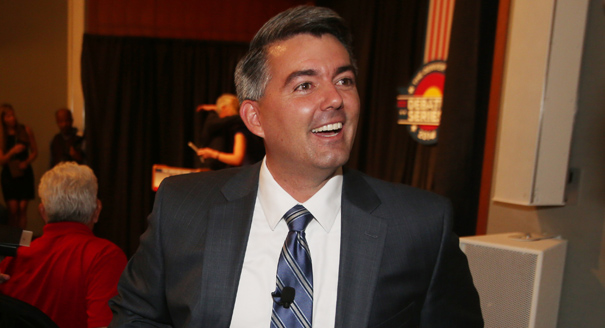Former U.S. Sen. Cory Gardner (R-CO) is expected to make another run at elected office, but his path to victory could become increasingly challenging due to Colorado’s changing demographic, according to political analysts.
“I think he’s a very ambitious guy. I never expected he would simply fade back into private life unconnected to the Republican Party,” Norm Ornstein, a political scientist and emeritus scholar at the Washington, D.C.-based American Enterprise Institute, told the Colorado Times Recorder. “What we see here is a choice that gives him a couple of options.”
Gardner, who lost his Senate re-election bid to former Colorado Gov. John Hickenlooper in November, recently landed a new job: that of a Republican fundraiser.
The former senator earlier this month became chairman of a newly formed super PAC called National Victory Action Fund. The super PAC’s stated mission is to solicit donations for candidates’ own campaign accounts—instead of raising money for groups that wage campaigns on behalf of candidates.
“Out in Colorado, we had far-left groups from out of state saturating the airwaves with millions in television ads years before Election Day,” Gardner is quoted as saying on the PAC’s official website. “When I finally had enough money to respond in kind, they had already influenced public opinion in a way that was almost impossible to overcome. I’m proud to join with NVAF because getting resources to campaigns is vital if we want to prevent this from happening to other candidates.”
While it initially may seem surprising that Gardner took this role, it could prove beneficial for his political future, according to political observers. If the 2022 midterm elections go as they most often do, the party of the incumbent president tends to lose seats in Congress. For all midterm elections since 1946, the average midterm loss for the president’s party is 25 House seats, according to Gallup.
And should Gardner’s super PAC contribute to Republicans winning back control of the Senate or the House, Gardner could become a “hero inside the party” and increase his options for a potential future run for office, Ornstein said.
“If they raise a significant sum of money, he is going to have a whole lot of Republican Senate candidates who are indebted to him or are going to be happy with him, and some of them are going to win,” he said. “At the same time, he can kind of keep his options open if it turns out that the tide turns and things move back more in a Republican direction.”
The biggest obstacle to Gardner winning another statewide election in Colorado could be the changing makeup of the state itself. Colorado has become very much a purple state over the past decades.
This shift from a dominantly red state to a more Democratic-leaning swing state is due, in part, to the significant population increase, particularly in the state’s urban centers. The percentage of rural votes among total votes dropped from 17% in 1980 to 13% in 2016. Over the same time period the urban vote increased by 146%, according to a Denver Post report.
Facing blue headwinds at the starting gate, Gardner deepened his own problems by showing so little independence from Trump, refusing to meet with constituents, and, at times, losing his composure with the press and elsewhere, according to some analysts.
“The challenge [for Gardner] is what he would run for unless it’s something statewide, but that’s just a tough one to try to grapple with because Colorado is really more of a blue purple state than a red purple state,” GOP strategist and political consultant Matt Klink told the Colorado Times Recorder.
Gardner served one term as a U.S. senator and two terms in the House of Representatives.
Congressman Ken Buck (R-CO), who announced in January that he will not seek a second term as chairman of the Colorado Republican Party, predicted at a recent dinner event that Gardner would return to public office.
He called Gardner the best U.S. senator in Colorado history and said not re-electing him says something bad about the state, according to the Fort Morgan Times. “I predict Cory will be back,” Buck said.
Gardner, who also attended the dinner, didn’t address his future.
“My guess is that he’d love to be back in the Senate,” Ornstein said, and for any Republican in Colorado that means “winning over educated suburban voters.”
But even if he forgoes another run for office in Colorado, the 46-year-old Gardner could be a prime candidate for a future cabinet position.
“He’s someone who could definitely fill a spot in a future Republican administration,” Klink said. “[He’s] someone who’s won statewide in an important state like Colorado. And he’s young, too. So he’s got lots of time in politics.”




